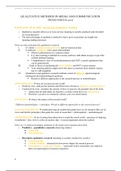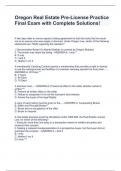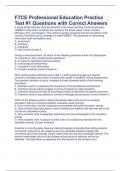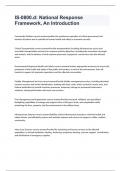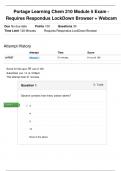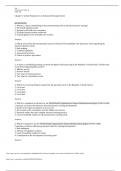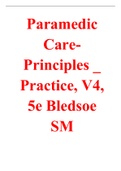QUALITATIVE METHODS IN MEDIA AND COMMUNICATION
(lecture notes) [by gycc]
WEEK ONE | 09.11.2020 - Introducing Qualitative Methods
o Qualitative research allows us to focus on how meaning is socially produced and circulated
via social practices
o The main advantage of qualitative methods is that it gives researchers an insight into
meaning-making processes
There are four principles for qualitative research:
I. It’s about meaning-making processes and not numerical data
II. It embraces complexity (not causal relationships)
Observes phenomenon in a natural context
E.g. How learning is defined in a society and how individuals accept or reject this
socially defined meaning
Comprehensive view of social phenomenon (and NOT a causal explanation that
can be generalized)
III. Tends to focus on explaining the micro insights and NOT a macro picture
Your studying patterns might not be the same as someone from another country,
but it’s still insightful
IV. Quantitative and qualitative research methods consist of different epistemological,
ontological and methodological positions
Results in different approaches in the research process or methodologies
EPISTEMOLOGY how do we know/see the world?
o Positivist view: analyses the patterns and behaviours of lions as objective/ neutral observer
o Constructivist view: considers the reasons of how we perceive the parental role of the lions
Admits that all individuals are biased to a certain extent due to its cultural lens
Therefore, you have to constantly criticise your own observations
ONTOLOGY what is the nature of the (social) world?
“Different epistemologies + ontologies lead to different approaches to the research process”
(research) PARADIGMS intellectual maps & models that guides how we do research OR a set of
views and beliefs (principles) that guide the work of researchers // philosophical + methodological
METHODOLOGY set of instructions about how to study the social world + practices of studying
it (methods) // also, how to collect & analyse data + reasons/arguments about the method
There are 5 common paradigms dominant in the media and communication field;
o Predictive – quantitative research (observing reality):
Positivism
Post-positivism
o Descriptive qualitative research (meaning is socially construct by society):
Constructivism
Critical tradition – interested in how power shapes the research process
Participatory/ Cooperative inquiry – interested in how researchers can empower
their own participants to become researchers
1
,qualitative methods in media and communication cm2006 | ibcom ba year II - term II (2020-2021) [by gycc]
Therefore, there is a need to shift
perspectives – from quantitative
to qualitative!
which also entails a change
towards a new vocabulary
The core features of qualitative research:
I. Insightful – gives sense about social-cultural processes
II. Complex – recognising that the world is complicated (e.g. how is power distributed?)
III. Emancipatory – focuses on processes as aim to create change
The qualitative research process:
Everyone is actually doing research in their everyday lives – analysing which phone to buy - but
social science research is obviously different:
o Intentionality – there is a reason
o Methodological process – following a key process to gather and analyse information
Requires us to make choices
this should be explained and justified
transparency is key!
Qualitative research is iterative – all elements are changeable and adjustable
There are 6 steps when planning / preparing a qualitative research:
I. Field / Topic
View of communication:
Ritualistic – one person communicates and the other respond, etc
Meaning-making process – how to interpret symbols or gestures of communication
this is intersubjective by nature
Sources of research ideas:
Personal experiences
Related experiences and circumstances
Societal problems (e.g. refugees, terrorism, etc)
Theory & literature
Funding priorities
II. Taking a perspective
Decision of the angle / focus of your broad topic
Theoretical perspectives could inform how we plan to do our research
Theory informs our research process and analysis in the process
Theoretical assumptions are linked to our methods
III. Developing a research question
It should be answerable, open ended & incorporates a theoretical concept
IV. Designing your research (project)
What type of evidence is needed in order to answer the research question in a
convincing way?
The methodology (e.g. focus groups or interviews) will be related to the
perspective you have on either theories or the research question
Important: research design should be detailed and transparent!
Consider the advantages and disadvantages of your research
V. Data collection & analysis
2
, qualitative methods in media and communication cm2006 | ibcom ba year II - term II (2020-2021) [by gycc]
Gathering evidence through the usage of methodologies
Analysing and interpreting data
VI. Writing all your research general lay-out: Introduction, RQs, Theoretical framework,
Literature review, Methodology, Analysis, interpretation and commentary, Conclusion,
References & (reflexivity) – throughout and after the research process
The ethics of qualitative research:
aim of qualitative research is to get insight and in-depth knowledge and understanding into
people’s lives and the complex features of their meaning-making processes; this results in ethical
considerations that qualitative researchers have dealt with for quite some years – for instance:
o The ‘Tearoom Trade’ by Laud Humphreys: detailed sexual behaviour of homosexual
encounters in public places // published in 1970s
Participants were largely living conventional lives: married men
Researcher acted as lookout, made undisclosed recordings, lied to the police to get
license plate information to research the participants at their homes
Led to a fair amount of ethical issues: to what degree do we not disclose what we are
actually doing? When do we make it clear what research we are involved in?
Several ethics purpose and principles should be taken into account, because:
o Protection
For the researcher, for the participants and the research data
What do you expect? What do the subjects expect? What will be done with the data?
o Basic principles of qualitative research according to Flick:
There should be (ethics) informed consent (required part of research)
People should:
Participate on volunteer basis
Should understand the study and their participation in it
Able to understand risks and benefits
Be personally able to give consent
Avoid deception
Privacy and confidentiality
Data accuracy
Respect
Well-being (of the participants)
Justice (e.g. the benefits and challenges people are dealing with, such as COVID-19)
How do we engage in ethical research?
REMEMBER: stories are
produced with respondents rather
than solely by the researchers or
the participants
(it’s our understanding about the
connection of us with them and
the world and how we interpret
their stories to answer the RQ)
Always include:
reflexivity
“full disclosure is always appropriate in the realm of qualitative research” - Brennen
3


